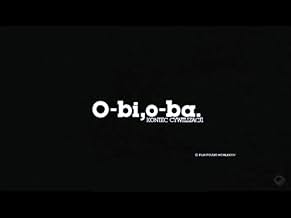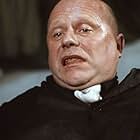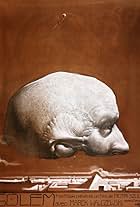IMDb RATING
7.2/10
2.2K
YOUR RATING
A man searches for survival after nuclear war forces people into an underground bunker. The inhabitants await rescue while their refuge decays around them.A man searches for survival after nuclear war forces people into an underground bunker. The inhabitants await rescue while their refuge decays around them.A man searches for survival after nuclear war forces people into an underground bunker. The inhabitants await rescue while their refuge decays around them.
- Awards
- 1 win total
- Director
- Writer
- All cast & crew
- Production, box office & more at IMDbPro
Featured reviews
I like Polish films, I've seen a lot, all of Andrzej Wajda's films, all of Polanski's, some of Jerzy Skolimowski's, some of Andrzej Zulawski's, some of Krzysztof Kieslowski's, some of Krzysztof Zanussi's, etc. They are not easy to digest, just as this "O-Bi, O-Ba: The End of Civilization" is not (the meaning of "O-Bi, O-Ba" is not clear at all). It is the first film made by director Piotr Szulkin that I have seen. I saw Jerzy Stuhr in the very special "Sexmission" (1984) and in "A Year of the Quiet Sun" (1984). I saw the beautiful Krystyna Janda in "Man of Iron" (1981), "Mephisto" (1981), "The Conductor" (1980), "Man of Marble" (1977). Another well-known name is Leon Niemczyk, probably the most prolific Polish actor of all time (325 films) seen by me in many, the most famous being "Knife in the Water" (1962). OK, about the movie now: I'm not going to narrate it like many do. I'll just say that it's worth seeing, even though it's just talk in a closed space, an underground bunker (where, strange situation, after the nuclear war, there is electricity, there are neon lights everywhere). The fact that it is filmed a lot in motion by the talented Witold Sobocinski, mitigates the phenomenon of claustrophobia.
A Comprehensive Analysis of *O-Bi, O-Ba: The End of Civilization* (1985)
Introduction *O-Bi, O-Ba: The End of Civilization* is one of the cornerstones of European dystopian cinema from the 1980s. Directed by *Piotr Szulkin* in 1985, the film is part of his series of thought-provoking science fiction works, which explore deep philosophical and social themes. It reflects the oppressive and bleak atmosphere of communist-era Poland, where censorship and control dominate, and people cling to hope-even if it is an illusion.
The film addresses key themes such as the manipulation of hope, the inefficiency of bureaucracy, and the collapse of human values in times of crisis. Through a grim visual environment and a narrative that blends absurdity with philosophical reflection, the film paints a terrifying picture of a post-apocalyptic world where survival is the only goal.
---
Plot Summary
The story takes place in an underground shelter where a group of survivors live after an unspecified nuclear catastrophe. The destruction on the surface has forced them into total isolation. The shelter consists of narrow corridors and decaying walls, creating a sense of suffocation and psychological distress.
The protagonist, *Soft*, is a government official working for the ruling authority of the shelter. His primary task is to maintain order among the survivors, but he finds himself surrounded by lies and deception. Everyone speaks of "The Ark," a mythical vessel that is supposedly coming soon to rescue the survivors and transport them to a better place, where life is less harsh and more hopeful.
As time passes, *Soft* discovers that *The Ark* is nothing more than a fabricated myth created by the authorities to maintain stability and prevent the population from succumbing to despair or rebellion. This illusion gives them something to live for, even though it is not real. As conditions in the shelter worsen, *Soft* begins to question whether exposing the truth is better than letting people live in blissful ignorance.
As tensions rise, society within the shelter begins to collapse. Rebel groups emerge, hysteria spreads, and the government loses control. In the end, it becomes evident that hope for salvation may be nothing more than an unattainable illusion, leaving the fate of the characters ambiguous.
---
Symbolism and Philosophical Themes
1. Hope as a Tool for Control One of the most significant themes explored in the film is how hope can be used to keep people obedient and submissive. *The Ark* is nothing more than a legend, yet it provides the survivors with a sense of purpose.
This concept parallels how political and religious ideologies are often used by oppressive regimes to manipulate people, offering false promises of salvation-whether through a "better future," a "utopia," or even "heaven"-to keep the masses under control.
2. The Absurdity of Bureaucracy and Corrupt Authority *Soft* is not an evil character, but rather a trapped bureaucrat. He is stuck between following orders and dealing with the grim reality of the shelter. He knows *The Ark* is a lie, yet he cannot openly acknowledge it.
This reflects the bureaucratic system that prevailed in communist regimes, where officials were merely cogs in a massive machine that cared little for human lives. Even when the truth is evident, bureaucracy remains paralyzed, fearing the loss of its power.
3. Social Collapse After Catastrophe The film serves as a psychological study of human behavior in times of crisis. In the absence of resources and security, people abandon morality and turn into desperate beings solely focused on survival.
The situation in the shelter deteriorates gradually, with rising anger, fear, and selfishness. Some characters become more brutal, while others descend into madness or complete isolation. The film illustrates how civilization is merely a fragile construct that can crumble easily when faced with a major catastrophe.
4. The Relationship Between Truth and Illusion The film forces the viewer to ask: is it better to live in a comforting illusion or to face a harsh reality? Most of the shelter's inhabitants prefer to believe in *The Ark*, even though there is no evidence of its existence.
On the other hand, when *Soft* discovers the truth, he finds no further meaning in life. The film suggests that some lies may be necessary to preserve human willpower because the truth, when inescapable, can be utterly devastating.
---
Visual and Musical Style
1. Cinematography The film employs a dark and bleak visual style, relying on dim lighting and desaturated colors to evoke feelings of isolation and despair. Most scenes within the shelter are filmed from tight, claustrophobic angles, reinforcing a sense of suffocation and entrapment.
The production design features decaying structures, rusted doors, and crumbling corridors, making the world feel like it is disintegrating, mirroring the psychological state of its inhabitants.
2. Soundtrack The soundtrack further enhances the film's tension and unease. Using distorted electronic tones and industrial noise, the music creates an atmosphere of paranoia and instability. The sounds are not merely background elements but integral to the film's unsettling ambiance.
---
Conclusion and Impact
*O-Bi, O-Ba: The End of Civilization* stands as one of the boldest European science fiction films of the 1980s, offering a terrifying yet intelligent examination of humanity's fate in the wake of catastrophe. Although classified as a sci-fi film, its messages extend to political and social realities, making it a critical analysis of societies that survive on deception and false promises.
The film leaves viewers with profound questions about the nature of hope, the role of authority in shaping perceived reality, and whether humanity can survive without illusions that provide meaning. More than three decades after its release, the film remains highly relevant, especially in a world where utopian promises often lead to dystopian nightmares.
Introduction *O-Bi, O-Ba: The End of Civilization* is one of the cornerstones of European dystopian cinema from the 1980s. Directed by *Piotr Szulkin* in 1985, the film is part of his series of thought-provoking science fiction works, which explore deep philosophical and social themes. It reflects the oppressive and bleak atmosphere of communist-era Poland, where censorship and control dominate, and people cling to hope-even if it is an illusion.
The film addresses key themes such as the manipulation of hope, the inefficiency of bureaucracy, and the collapse of human values in times of crisis. Through a grim visual environment and a narrative that blends absurdity with philosophical reflection, the film paints a terrifying picture of a post-apocalyptic world where survival is the only goal.
---
Plot Summary
The story takes place in an underground shelter where a group of survivors live after an unspecified nuclear catastrophe. The destruction on the surface has forced them into total isolation. The shelter consists of narrow corridors and decaying walls, creating a sense of suffocation and psychological distress.
The protagonist, *Soft*, is a government official working for the ruling authority of the shelter. His primary task is to maintain order among the survivors, but he finds himself surrounded by lies and deception. Everyone speaks of "The Ark," a mythical vessel that is supposedly coming soon to rescue the survivors and transport them to a better place, where life is less harsh and more hopeful.
As time passes, *Soft* discovers that *The Ark* is nothing more than a fabricated myth created by the authorities to maintain stability and prevent the population from succumbing to despair or rebellion. This illusion gives them something to live for, even though it is not real. As conditions in the shelter worsen, *Soft* begins to question whether exposing the truth is better than letting people live in blissful ignorance.
As tensions rise, society within the shelter begins to collapse. Rebel groups emerge, hysteria spreads, and the government loses control. In the end, it becomes evident that hope for salvation may be nothing more than an unattainable illusion, leaving the fate of the characters ambiguous.
---
Symbolism and Philosophical Themes
1. Hope as a Tool for Control One of the most significant themes explored in the film is how hope can be used to keep people obedient and submissive. *The Ark* is nothing more than a legend, yet it provides the survivors with a sense of purpose.
This concept parallels how political and religious ideologies are often used by oppressive regimes to manipulate people, offering false promises of salvation-whether through a "better future," a "utopia," or even "heaven"-to keep the masses under control.
2. The Absurdity of Bureaucracy and Corrupt Authority *Soft* is not an evil character, but rather a trapped bureaucrat. He is stuck between following orders and dealing with the grim reality of the shelter. He knows *The Ark* is a lie, yet he cannot openly acknowledge it.
This reflects the bureaucratic system that prevailed in communist regimes, where officials were merely cogs in a massive machine that cared little for human lives. Even when the truth is evident, bureaucracy remains paralyzed, fearing the loss of its power.
3. Social Collapse After Catastrophe The film serves as a psychological study of human behavior in times of crisis. In the absence of resources and security, people abandon morality and turn into desperate beings solely focused on survival.
The situation in the shelter deteriorates gradually, with rising anger, fear, and selfishness. Some characters become more brutal, while others descend into madness or complete isolation. The film illustrates how civilization is merely a fragile construct that can crumble easily when faced with a major catastrophe.
4. The Relationship Between Truth and Illusion The film forces the viewer to ask: is it better to live in a comforting illusion or to face a harsh reality? Most of the shelter's inhabitants prefer to believe in *The Ark*, even though there is no evidence of its existence.
On the other hand, when *Soft* discovers the truth, he finds no further meaning in life. The film suggests that some lies may be necessary to preserve human willpower because the truth, when inescapable, can be utterly devastating.
---
Visual and Musical Style
1. Cinematography The film employs a dark and bleak visual style, relying on dim lighting and desaturated colors to evoke feelings of isolation and despair. Most scenes within the shelter are filmed from tight, claustrophobic angles, reinforcing a sense of suffocation and entrapment.
The production design features decaying structures, rusted doors, and crumbling corridors, making the world feel like it is disintegrating, mirroring the psychological state of its inhabitants.
2. Soundtrack The soundtrack further enhances the film's tension and unease. Using distorted electronic tones and industrial noise, the music creates an atmosphere of paranoia and instability. The sounds are not merely background elements but integral to the film's unsettling ambiance.
---
Conclusion and Impact
*O-Bi, O-Ba: The End of Civilization* stands as one of the boldest European science fiction films of the 1980s, offering a terrifying yet intelligent examination of humanity's fate in the wake of catastrophe. Although classified as a sci-fi film, its messages extend to political and social realities, making it a critical analysis of societies that survive on deception and false promises.
The film leaves viewers with profound questions about the nature of hope, the role of authority in shaping perceived reality, and whether humanity can survive without illusions that provide meaning. More than three decades after its release, the film remains highly relevant, especially in a world where utopian promises often lead to dystopian nightmares.
I saw this movie in Hungary a long time ago, and it immediately became one of my all-time favorites, sharing this distinguished title with Tarantino's & Spielberg's films. (I haven't been successful in locating a dubbed or captioned English version so far. English language support would greatly increase the chances of this masterpiece for being recognized across the world.)
The movie is totally grotesque, and often shocking, spiced up with the perfect amount of cynicism & delicate humor. It is the ultimate depressing negative utopia; much superior in every sense to most flicks spewed up by Hollywood in the same genre.
The movie is totally grotesque, and often shocking, spiced up with the perfect amount of cynicism & delicate humor. It is the ultimate depressing negative utopia; much superior in every sense to most flicks spewed up by Hollywood in the same genre.
O-bi O-ba, through the dystopian Illustrating of a micro-society set in an underground dungeon after a nuclear holocaust, is surprisingly perfect. The story follows a wandering hero through different landscapes that dominate each of the levels of the refuge.
It was released in 1985, the same year as another, quite similar film: Terry Gilliam's Brazil. Perhaps something was in the air over all of Europe at the time, something moving freely and without heed of the iron curtain, something grotesque enough to bend men's minds to craft images like this one:
With a budget that we can easily guess very limited, produced in a country of the communist bloc only a few years before the collapse of the USSR, the Polish director Piotr Szulkin has succeeded beyond all these constraints to create a minimalist yet coherent and very immersive science-fiction universe. The film offers a dark and hopeless atmosphere, in an oppressive environment, here people cling on a belief, of a prophecy - the Ark. Its a metaphorical bomb all around with many possible interpretations.
Alongside Soft, the protagonist, we are gradually discovering the different layers constituting the lie, this mirage which maintains order in this society. Under these conditions, a handful of men is enough to keep the control mechanisms operational, and work to ensure that they remain so once the Dome is shattered, one step ahead of its inhabitants, obsessed with their survival and their salvation. The Dome and the Ark, the Soviet grip and the mirage of the West, is only one among many interpretations that can be found inO-bi, O-ba, political, religious or emotional. There remains a particularly desperate look on the enslaving power of belief, on the predisposition of some to embrace it and on the will of others to exploit it.
It was released in 1985, the same year as another, quite similar film: Terry Gilliam's Brazil. Perhaps something was in the air over all of Europe at the time, something moving freely and without heed of the iron curtain, something grotesque enough to bend men's minds to craft images like this one:
With a budget that we can easily guess very limited, produced in a country of the communist bloc only a few years before the collapse of the USSR, the Polish director Piotr Szulkin has succeeded beyond all these constraints to create a minimalist yet coherent and very immersive science-fiction universe. The film offers a dark and hopeless atmosphere, in an oppressive environment, here people cling on a belief, of a prophecy - the Ark. Its a metaphorical bomb all around with many possible interpretations.
Alongside Soft, the protagonist, we are gradually discovering the different layers constituting the lie, this mirage which maintains order in this society. Under these conditions, a handful of men is enough to keep the control mechanisms operational, and work to ensure that they remain so once the Dome is shattered, one step ahead of its inhabitants, obsessed with their survival and their salvation. The Dome and the Ark, the Soviet grip and the mirage of the West, is only one among many interpretations that can be found inO-bi, O-ba, political, religious or emotional. There remains a particularly desperate look on the enslaving power of belief, on the predisposition of some to embrace it and on the will of others to exploit it.
Stellar cinematography gives way to average narrative devoid of the visual "shock" similar films like Threads & The Day After possess. But because it lacks shock, it is a thoroughly more enjoyable experience.
Moreover, it differentiates itself by providing insight into a less discussed aspect of the post-nuclear world:
the obnoxious nature of the human condition.
Moreover, it differentiates itself by providing insight into a less discussed aspect of the post-nuclear world:
the obnoxious nature of the human condition.
- How long is O-Bi, O-Ba: The End of Civilization?Powered by Alexa
Details
- Release date
- Country of origin
- Language
- Also known as
- О-би, О-ба - Конец цивилизации
- Production company
- See more company credits at IMDbPro
Contribute to this page
Suggest an edit or add missing content

Top Gap
By what name was O-Bi, O-Ba: The End of Civilization (1985) officially released in India in English?
Answer


































